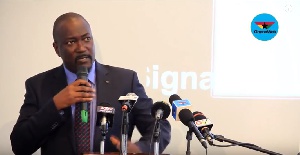Prof. H. Kwasi Prempeh has said a ruling by the Supreme Court on an attempt by civil society organisations to join the case against the compilation of a voters’ register by the Electoral Commission stands against everything he knows.
The Executive Director of the of Ghana Center for Democratic Development (CDD-Ghana) said in a Facebook post on Wednesday, June 24, 2020, that the reason given by the apex court for refusing to allow the CSOs to file the amicus brief is the exact opposite of everything he knows about amicus briefs.
“This is the first time in my life as a constitutional law scholar and lawyer, trained in the Anglo-American legal tradition, that I am learning that in order to be allowed permission to file an amicus curiae brief, one must be ‘neutral’ or disinterested in the case in question. This is the exact opposite of everything I know about amicus briefs.
“Typically, one who is not otherwise a party to a case before an appellate or apex court must demonstrate a strong ‘interest’ in the matter in order to be allowed the opportunity to submit an amicus brief. Why would a person who is disinterested or neutral even bother to file an amicus brief?” he quizzed.
The seven-member panel of Justices of the Supreme Court, presided over by Chief Justice Kwasi Anin Yeboah, unanimously dismissed the request to allow the IMANI Africa and the CSOs to join the case saying their application is not supported by law.
The groups have been at the forefront of the push to get the EC to back down on its attempt to compile a new electoral roll for the December general elections.
The CSOs believe, among other things, that the exercise is a waste of money.
An amicus brief is a request by someone who is not a party to a case to be allowed to join it to demonstrate expertise or provide knowledge that will have a bearing on the case.
But lawyers for the CSOs were prevented by the Supreme Court judges who questioned whether they are indeed coming as friends of the court to assist it or as friends of a certain party in the case.
Expressing his utter surprise over the ruling on his Facebook wall, H. Kwesi Prempeh said: “Especially in Ghana, where Article 2 of the Constitution entitles any citizen, natural or artificial, to bring a constitutional case before the Supreme Court, the idea that, once a certain party has already brought a matter, the outcome of which binds all citizens equally, no other person may file an amicus in the matter unless they are ‘neutral’ (whatever that means) is simply illogical and, indeed, turns Article 2 on its head.”
The ruling, in his view “means, any person with a lawyer can just race to the Court to file an article 2 case, essentially binding all of us (which is what a case with constitutional consequence means in effect), and, simply by being first to file that case, essentially prevent all other equally interested (and affected) citizens from submitting an amicus brief in the same matter.”
The other CSOs that had filed the amicus brief to join case are the Conservative Policy Research Centre and Institute for Liberty, Policy Innovation Alliance for Social Equity and Public Accountability (ASEPA).
There are already two pending cases at the Supreme Court filed by the opposition National Democratic Congress (NDC) and one Mark Takyi-Banson, a private citizen, all seeking to stop the EC from compiling the register.
Another one is at the High Court filed by Ashaiman MP Ernest Norgbey asking for the EC to be compelled to stop the process the compile a new electoral roll.
General News of Wednesday, 24 June 2020
Source: www.ghanaweb.com













